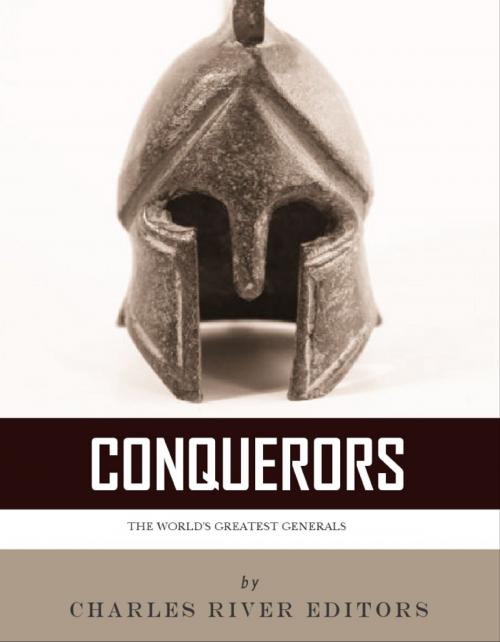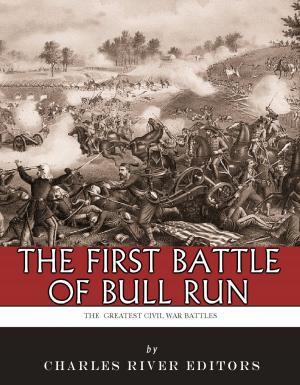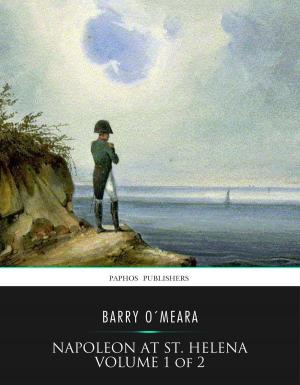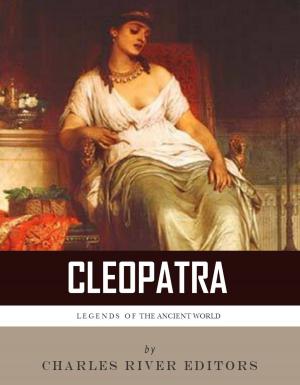Conquerors: The Lives and Legacies of Alexander the Great, Julius Caesar, and Napoleon Bonaparte
Nonfiction, History, Ancient History, Rome, France| Author: | Charles River Editors | ISBN: | 9781475316469 |
| Publisher: | Charles River Editors | Publication: | August 24, 2012 |
| Imprint: | Language: | English |
| Author: | Charles River Editors |
| ISBN: | 9781475316469 |
| Publisher: | Charles River Editors |
| Publication: | August 24, 2012 |
| Imprint: | |
| Language: | English |
*Includes pictures depicting important people, places, and events in each man's life.*Discusses interesting, lesser known facts about each man and answers common myths and misconceptions about them. Was Alexander referenced in the Qur'an? What were Caesar's last words? Was Napoleon really short?*Includes bibliographies on Napoleon and Alexander for further reading. *Includes a Table of Contents.There is nothing impossible to him that will but try AlexanderI would rather be the first man in a humble village, than the second man in Rome CaesarCourage cannot be counterfeited. It is the one virtue that escapes hypocrisy. NapoleonOver the last 2,000 years, ambitious men have dreamed of conquering vast empires and attaining eternal glory in battle, but of all the men who took steps toward such dreams, few were as successful as Alexander the Great, Julius Caesar, and Napoleon Bonaparte, all of whom have been inextricably tied together by their successes and ambitions. Over the last 200 years, would-be conquerors and generals hoped to rival Napoleons accomplishments, while Napoleon aimed to emulate the accomplishments of Julius Caesar. But Caesar himself found inspiration in Alexander the Great (356-323 B.C.), the Macedonian King who managed to stretch an empire from Greece to the Himalayas in Asia at just 30 years old. It took less than 15 years for Alexander to conquer much of the known world. Alexander was responsible for establishing 20 cities in his name across the world, most notably Alexandria in Egypt, and he was directly responsible for spreading Ancient Greek culture as far east as modern day India and other parts of Asia. Alexander was a legend in his own time, and one of the men who viewed his body was possibly the most important man of antiquity, and even all of history: Julius Caesar. The ultimate conqueror, statesman, dictator, visionary, and opportunist, during his time in power Caesar expanded the borders of Rome to almost twice their previous size, revolutionized the infrastructure of the Roman state, and destroyed the Roman Republic for good, leaving a line of emperors in its place. His legacy is so strong that his name has become, in many languages, synonymous with power: the Emperors of Austria and Germany bore the title Kaiser, and the Czars of Russia also owe the etymology of their title to Caesar. His name also crept further eastward out of Europe, even cropping up in Hindi and Urdu, where the term for Emperor is Kaisar. When historians are asked to list the most influential people of the last 200 years, a handful of names might vary, but there is no question that the list will include Napoleon Bonaparte (1769-1821), the most successful French leader since Charlemagne and widely acknowledged as one of the greatest generals ever. Indeed, Napoleon was likely the most influential man of the 19th century, leaving an indelible mark on everything from the strategy and tactics of warfare to the Napoleonic Code that drafted laws across the continent. To defeat Napoleon, the Europeans had to form large coalitions multiple times, which helped bring about the entangling alliances that sparked World War I after Europe was rebuilt following Waterloo and the Congress of Vienna. Conquerors chronicles the amazing lives and accomplishments of these conquerors, while discussing and explaining some of the myths and legends that have surrounded them for centuries. Along with pictures of important people, places, and events, you will learn about Alexander the Great, Julius Caesar, and Napoleon Bonaparte like you never have before, in no time at all.
*Includes pictures depicting important people, places, and events in each man's life.*Discusses interesting, lesser known facts about each man and answers common myths and misconceptions about them. Was Alexander referenced in the Qur'an? What were Caesar's last words? Was Napoleon really short?*Includes bibliographies on Napoleon and Alexander for further reading. *Includes a Table of Contents.There is nothing impossible to him that will but try AlexanderI would rather be the first man in a humble village, than the second man in Rome CaesarCourage cannot be counterfeited. It is the one virtue that escapes hypocrisy. NapoleonOver the last 2,000 years, ambitious men have dreamed of conquering vast empires and attaining eternal glory in battle, but of all the men who took steps toward such dreams, few were as successful as Alexander the Great, Julius Caesar, and Napoleon Bonaparte, all of whom have been inextricably tied together by their successes and ambitions. Over the last 200 years, would-be conquerors and generals hoped to rival Napoleons accomplishments, while Napoleon aimed to emulate the accomplishments of Julius Caesar. But Caesar himself found inspiration in Alexander the Great (356-323 B.C.), the Macedonian King who managed to stretch an empire from Greece to the Himalayas in Asia at just 30 years old. It took less than 15 years for Alexander to conquer much of the known world. Alexander was responsible for establishing 20 cities in his name across the world, most notably Alexandria in Egypt, and he was directly responsible for spreading Ancient Greek culture as far east as modern day India and other parts of Asia. Alexander was a legend in his own time, and one of the men who viewed his body was possibly the most important man of antiquity, and even all of history: Julius Caesar. The ultimate conqueror, statesman, dictator, visionary, and opportunist, during his time in power Caesar expanded the borders of Rome to almost twice their previous size, revolutionized the infrastructure of the Roman state, and destroyed the Roman Republic for good, leaving a line of emperors in its place. His legacy is so strong that his name has become, in many languages, synonymous with power: the Emperors of Austria and Germany bore the title Kaiser, and the Czars of Russia also owe the etymology of their title to Caesar. His name also crept further eastward out of Europe, even cropping up in Hindi and Urdu, where the term for Emperor is Kaisar. When historians are asked to list the most influential people of the last 200 years, a handful of names might vary, but there is no question that the list will include Napoleon Bonaparte (1769-1821), the most successful French leader since Charlemagne and widely acknowledged as one of the greatest generals ever. Indeed, Napoleon was likely the most influential man of the 19th century, leaving an indelible mark on everything from the strategy and tactics of warfare to the Napoleonic Code that drafted laws across the continent. To defeat Napoleon, the Europeans had to form large coalitions multiple times, which helped bring about the entangling alliances that sparked World War I after Europe was rebuilt following Waterloo and the Congress of Vienna. Conquerors chronicles the amazing lives and accomplishments of these conquerors, while discussing and explaining some of the myths and legends that have surrounded them for centuries. Along with pictures of important people, places, and events, you will learn about Alexander the Great, Julius Caesar, and Napoleon Bonaparte like you never have before, in no time at all.















